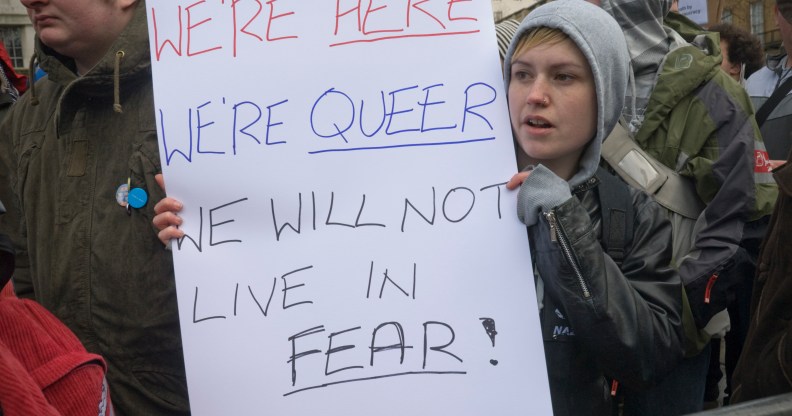Non-binary people in Iran don’t need a gender-neutral pronoun – because the language is already inclusive of them

Whitehall protest against deportion of asylum seeker Mehdi Kazemi, who faces the death penalty for homosexuality if sent back to Iran, London March 2008 UK. (Photofusion/Peter Marshall/Universal Images Group/Getty)
A non-binary person from Iran called Kaveh Mousavi has written a moving essay for Patheos about being Iranian and non-binary.
“My Pronoun is U”, the headline declares, and the piece goes on to explain that in the Persian language, nouns are not divided into genders but into living and non-living beings.
So all humans are referred to with the Persian pronoun of “U” – regardless of gender.
“My pronoun has always been gender-neutral,” Mousavi writes. “So I feel once one gets over the difficulty of cultural differences, Persian language is quite welcoming to non-binary people.”
“I tend to think that when the concept of non-binary finds its way into Iranian collective consciousness, other non-binary people will be as grateful to this humble Persian pronoun as I am. And that warms my heart.”
Pronouns can be, Mousavi acknowledges, a “sensitive issue” for Westerners.
“In many languages, pronouns are gendered, and therefore they are pregnant with lots of trauma and complexity for non-binary people,” they write.
“A pronoun is meant to represent the noun, and it’s painful to be represented by something that’s intrinsically not who you are. That’s why people either invoke literature for its gender-neutral pronouns, or invent new ones.”
“My pronoun, ultimately, is U. I’m not traumatised by ‘he’,” they say, “because it was never really my pronoun, it was used for me only in translation. My pronoun has always been gender-neutral.”
Authorities in Iran periodically crackdown on LGBT+ activity in the country. Same-sex sexual activity has been a crime punishable by death in Iran since the revolution in 1979.
Earlier this year, Iran’s foreign secretary defended the execution of gay people.
At a joint press conference with German foreign minister Heiko Maas in Tehran on Monday, Zarif was asked by a reporter for the German newspaper Bild: “Why are homosexuals executed in Iran because of their sexual orientation?”
“Our society has moral principles. And we live according to these principles,” Zarif answered.

